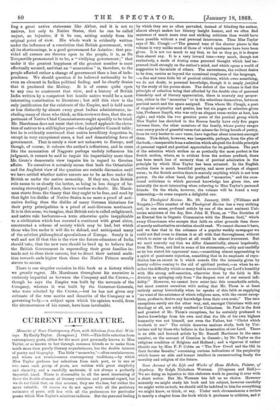The Theological Review. No. 20. January, 1868. (Williams and Norgate.)—This
number of the Theological Review has a very striking and, in one sense, profound article by one of the most eminent Uni- tarian ministers of the day, Rev. John H. Thom, on "The Doctrine of an Eternal Son in Organic Communion with the Human Soul," which every Churchman who accepts that faith on other grounds than those of merely authoritative revelation should read. We cannot discuss it here, and we fear that in the columns of a popular weekly newspaper we could not find room to discuss it at all with that thoroughness, without which to enter on the subject at all would be almost irreverent. Bat we need scarcely say that we differ diametrically, almost hopelessly, from Mr. Thom, and find in some of his statements,—ably and candidly as he has stated his opponents' case,—something almost approaching to a spirit of passionate rejection, something that in its emphasis of repu- diation has an accent in it which sounds like the intensity given by hearty volition coming to the aid of spiritual protest,—as when he as- cribes the difficulty which so many feel in reconciling our Lord's humility with His strong self-assertion, otherwise than by the faith in His. divinity, as springing only from " the deepest root of our natural infi- delity." However, we cannot here enter into this remarkable article, but must content ourselves with noting that Mr. Thom is at least entirely astray historically when he speaks of this faith as supplying "no want of the existence of which religions men, with the rarest excep- tions, profess to derive any knowledge from their own souls." The rare exceptions surely are the other way, and, amongst Christians with any theology at all, are solely confined to Unitarians. St. Paul is the first and greatest of Mr. Thom's exceptions, for he certainly professed to derive knowledge from his own soul that the life of his own highest humanity was not himself, nor even the Father, but " Christ which worketh in me." The article deserves anxious study, both by Uni- tarians and by those who believe in the Incarnation of our Lord. There is an able and learned article by Mr. Russell Martineau in the same number, on the account of Creation in Genesis ; by Mr. Tayler on the religious condition of Belgium and Holland ; and a vigorous if rather chaotic one by Miss F. P. Cobbe on " The New Creed and the Old in their Secular Results," containing curious indications of the perplexity which besets an able and honest intellect in reconstructing freely the morality and religion of the future.






























 Previous page
Previous page